Results
-
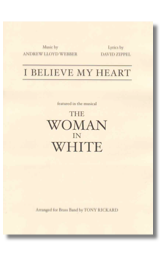 £39.95
£39.95I Believe My Heart (Score and Parts) - Andrew Lloyd Webber arr. Tony Rickard
The Ofcially Authorised brass band arrangement of this chart success. Tony Rickard's arrangement brilliantly captures the essence of this marvellous song and will make all grades of band sound like champions! What the papers say about The Woman in White... "...return to spectacular form" Sunday Times "A dazzling white hit" Daily Express "Andrew Lloyd Webber's best score in years" Guardian Tony Rickard is a skilled arranger whose work has been played and recorded by The London Trumpet Sound and Canadian Brass. He is the co-author of the highly sucessful Well Easy Trumpet Book.
Estimated dispatch 7-9 working days
-
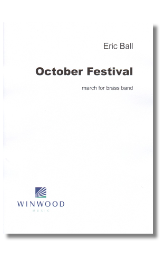 £48.95
£48.95October Festival (Score and Parts) - Eric Ball
This majestic march was written especially for the National Brass band Championships of Great Britain in 1978. Rousing and regal in style. This 40th Anniversary Edition has been beautifully engraved and comes with a full score for the first time. Duration: 6:30
Estimated dispatch 7-9 working days
-
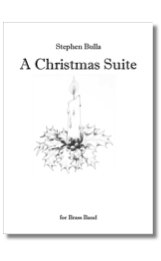 £49.95
£49.95A Christmas Suite (Score and Parts) - Stephen Bulla
The three-movement suite begins with the jaunty Wassail Song. The second movement is a wonderful version of Lo, how a rose e're blooming while the final movement is a bustling Pot-pourri with hints of several Christmas favourites. This new edition features a freshly engraved A4 size full score and parts and is compatible with the first edition.
Estimated dispatch 7-9 working days
-
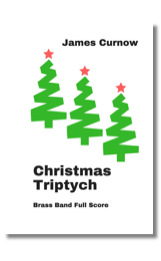 £49.95
£49.95Christmas Triptych (Score and Parts) - James Curnow
James Curnow's three-movement suite of Christmas favouriates includes settings of Westminster Carol; Joy to the World; Silent Night; Coventry Carol; and Good King Wenceslas. There is much to enjoy for both players and listeners. This newly engraved edition comes with A4 full score and parts. Duration: 7:00
Estimated dispatch 7-9 working days
-
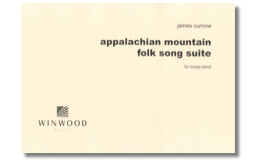 £49.95
£49.95Appalachian Mountain Folk Song Suite (Score and Parts) - James Curnow
Duration: 5:30 The Appalachian Mountain Range extends from the Gaspe Peninsula to Alabama in eastern North America. Out of these mountain areas has come a wealth of folk music that has been adapted by many composers and arrangers over the years. The present suite includes brief setting of three such melodies: 'Sourwood Mountain'; 'Black is the colour of my true love's hair'; and 'Camptown Races'. A full score is also available separately.
Estimated dispatch 7-9 working days
-
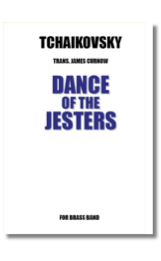 £49.95
£49.95Dance of the Jesters (Score and Parts)
New from internationally renowned James Curnow - a stunning arrangement of this rip-roaring dance from 'The Snow Maiden' by Tchaikovsky! It's great fun to play and makes an ideal concert opener or encore. A4 size score and parts provided. Duration 4:40
Estimated dispatch 7-9 working days
-
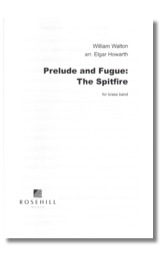 £51.95
£51.95Prelude and Fugue: The Spitfire (Score and Parts) - William Walton arr. Elgar Howarth
Originally part of the score Walton wrote for the film The First of the Few, this fabulous music found greater fame in the concert version he made in 1942. Now, at last, here is an authorised version for brass band by an acknowledged master of the art, in a beautiful new presentation from Winwood Music. The Prelude - essentially a march in his best Crown Imperial style leads to a dazzling Fugue which incorporates a quiet interlude before the dramatic finale. Whether used as a concert opener or roof-raising finale it is sure to delight audiences and players alike. Duration: 7:00
Estimated dispatch 7-9 working days
-
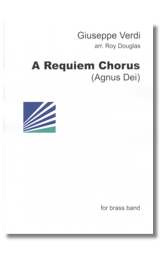 £39.95
£39.95A Requiem Chorus (Score and Parts) - Giuseppe Verdi
An excerpt of the 'Agnus Dei' from Verdi's Requiem - makes a lovely moment of clam in concerts or church use. Duration: c.2:30 Full score and parts provided
Estimated dispatch 7-9 working days
-
 £34.95
£34.95Three Carols (Brass Band - Score and Parts)
Three Carols was commissioned by the New York Philharmonic as part of their Holiday Brass series and was premiered at Avery Fisher Hall by the New York Philharmonic Principal Brass and Canadian Brass. Originally for 10 players, soon after the premiere I decided to score the piece for brass band. The brass band version was first performed by the New York Staff Band.Through the years I have been intrigued by carious carols from different countries and the challenge of creating musical treatments that sound fresh and original. When commissioned to write these brass arrangements, I wanted to create contrasting movements that could be performed either as a set or individually and thought that three carols from different countries would allow the opportunity for that contrast. The featured carols are the traditional Polish carol Infant Holy (C.C. 41), What child is this? (C.C. 100) with lyrics by William Dix and set to the English folk song Greensleeves and the lesser-known Catalonian carol Cold December flies away.- Joseph Turrin
Estimated dispatch 7-14 working days
-
 £12.00
£12.00The World Rejoicing (Brass Band - Study Score)
In searching for a common link between the brass band traditions of the various European countries that commissioned this work, I considered the fact that hymns have always played an important role in the relationship that brass bands have with their particular communities; and thus I turned to a well-known Lutheran chorale, Nun danket alle Gott (Now thank we all our God), written around 1636 by Martin Rinkart, with the melody attributed to Johann Crger. A number of composers have incorporated this chorale into their music, most famously J.S.Bach in his Cantatas no. 79 and 192, and Mendelssohn in the Lobsegang movement of his 2nd Symphony (the harmonization of which is usually used when this hymn is sung).It seemed fitting therefore for me to return to a compositional form I have used many times before (Variations) and to write a work based on this hymn. I have used it in a similar way to that which I employed in my Variations on Laudate Dominum of 1976 - that is, rather than writing a set of variations using elaborations of the complete tune, I have taken various phrases from the chorale and used them within the context of other musical material, applying an overall symphonic process of continuous variation and development. The structure, or sub-divisions of the work, which is through composed and plays without a break, is as follows: Prelude, Capriccio, La Danza 1, Processional, La Danza 2, Arias and Duets, Fuga Burlesca, Chorale, and Postlude.The work is also partly autobiographical - in the manner say of Strauss's Ein Heldenleben - in that I have incorporated into the score brief quotations from many of my other major works for brass band. In that respect, The World Rejoicing sums up a particular facet of my life as a composer, and reflects the admiration I have always had for what is surely one of the great amateur music-making traditions in the world.The World Rejoicing is dedicated 'in loving memory of my brother', Bramwell Logan Gregson, who sadly passed away in the Autumn of 2018.Edward Gregson
Estimated dispatch 7-14 working days
